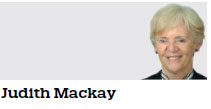Tobacco industry and the art of non-confession
Updated: 2017-12-06 06:14
(HK Edition)
|
|||||||||
An old Scottish proverb reads: "Open confession is good for the soul." If so, the tobacco industry is in need of some serious soul searching.
In 2006, a Federal District Court judge in Washington D.C. concluded after a nine-month trial that cigarette makers had engaged in fraud and racketeering in a decades-long conspiracy to deceive the public about the dangers of smoking.
The judge wrote in a 1,683-page opinion that the companies caused, "a staggering number of deaths per year, an immeasurable amount of human suffering and economic loss, and a profound burden on our national healthcare system".
The judge decreed that Philip Morris and other tobacco companies had "marketed and sold their lethal product with zeal, with deception, with a single-minded focus on their financial success, and without regard for the human tragedy or social costs that success exacted".

She ordered the nation's four largest cigarette makers to make "corrective statements" to the American people - admissions that they had lied and defrauded the public about the harms of their products and the mythic benefits of light and low-tar cigarettes, which the companies knew were just as dangerous as regular cigarettes.
The newspaper and television "corrective statement" ads will be paid for by Altria, R.J. Reynolds, Lorillard and Philip Morris. The ads were finally aired last month and will continue over the next several months.
The statements will cover the harmful effects of smoking, the addictiveness of smoking and nicotine, the fact that cigarettes described as "light", "low tar", "mild" and "natural" are as harmful as other cigarettes, the manipulation of cigarette design by the industry to maximize addiction and the adverse health impacts of second-hand smoke.
At first glance, this may seem like a victory for public health but any sense of justice is undercut by the industry's success in delaying their release by putting up a ferocious 11-year legal fight that successfully weakened the original statements.
The original statements called for companies to admit that they had lied; but the court agreed with their challenge that this requirement was "designed solely to shame and humiliate", and so that admission was removed.
One of the original statements required the phrase "here's the truth" for each of the statements, such as, "Here's the truth: Smoking is very addictive. And it's not easy to quit," This requirement to contrast the companies' lies with the truth was also successfully changed and removed.
The original statement that the industry had "deliberately deceived the American public" was replaced by a much weaker statement that "a federal court has ordered" the companies to "make this statement about the health effects of smoking". This change converted an impactful confession into a statement that reads like a government-issued warning.
Finally, over the past 11 years, television and print media have become less important. Few young people today obtain their information from TV or the print media. Four in 10 Americans now see their news online, where these corrective statements will not be required to appear.
It is a tragedy that the wealthy tobacco companies have successfully weakened well-intentioned attempts to call them to account for their deceptive practices that have caused hundreds of millions of deaths to date - a death rate that is accelerating.
The tragedy is magnified in that the deceptive practices of the industry are not confined to the US; they are global. In Asia we will never see even the watered-down "corrective statements" because these multinational companies are not required to air them outside the US.
The behavior of the industry seems to have hardly changed. Here in Hong Kong the government's modest proposal to increase the existing cigarette pack warnings from 50 percent to 85 percent of pack area this year was bitterly contested by the tobacco companies. Their tactics were to delay, obstruct and challenge the proposal, and tobacco-friendly legislators employed filibustering tactics in the Legislative Council. Reports from all over Asia indicate similar interference with tobacco control policies.
This ongoing interference with policy development is troubling, given the challenges that lie ahead for Hong Kong, including developing an "Endgame Plan" - reducing prevalence of smoking to single-digit percentages; increasing tobacco tax 100 percent next year; holding owners-managers of bars and restaurants accountable for enforcing the smoke-free law; changing pack warnings every two years and introducing plain packaging; banning product display at point of sale and increasing the minimum age of purchase to 21 years. Of paramount importance is to track tobacco industry connections with political parties, front organizations and those who receive funds from Big Tobacco. We can expect all of these proposals to be severely challenged by the industry in its unrelenting pursuit of profit.
This tale of the "corrective statements" teaches us that the industry will continue to act in ways that should require confessionbut confessions that are most unlikely to ever be uttered or heard.
Judith Mackay has been a world-renowned, Hong Kong-based anti-smoking campaigner for over three decades. She is a senior consultant to the World Health Organization and many governments. Geoffrey T. Fong is a professor of psychology and public health at the University of Waterloo in Canada.
(HK Edition 12/06/2017 page6)